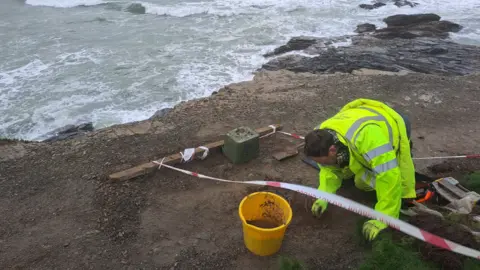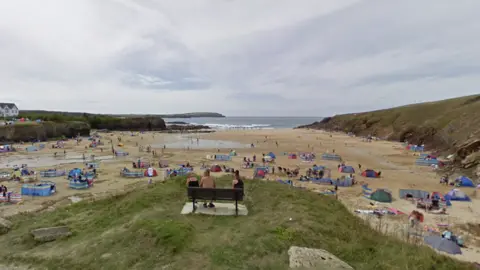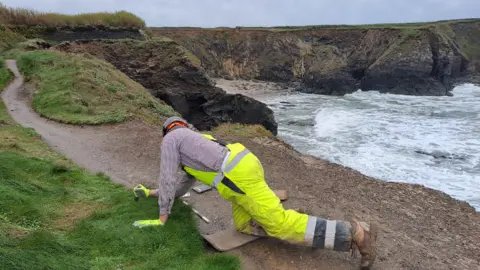Skeleton found on Cornwall coast may be shipwrecked sailor
 Cornwall Council
Cornwall CouncilRemains of a human skeleton discovered on a Cornish coastal path could have belonged to a shipwrecked sailor from the 18th or 19th Centuries.
The discovery at Trevone, overlooking Newtrain Bay, near Padstow, was made after coastal erosion.
Police and forensic experts established the remains were historic and the find was passed to Cornwall Council.
An expert said wear and tear on the bones might indicate a life of "hard labour, pulling, pushing and lifting".
 Google
GoogleAnn Reynolds, from the council's rural historic environment team, said: "Initial investigation has shown that the remains were of an adult, cut off just above the knees, potentially by the construction of an adjacent hedge.
"Two bones have shown heavy wear patterns, suggesting an exceptionally well-developed upper body muscle mass.
"This may indicate a life of hard labour, pulling, pushing and lifting.
"Given the location of the remains on the cliff and near the notoriously dangerous approach to Padstow Harbour, it is possible that they are of a shipwrecked sailor."
 Cornwall Council
Cornwall CouncilAfter 1808 the Grylls Act decreed that drowned remains washed ashore should be buried in consecrated ground.
Thomas Grylls, a Cornish solicitor, drew up the law on washed up remains following the wreck of the frigate HMS Anson off Loe Bar in 1807.
Prior to the act, remains were buried unceremoniously on the nearest cliff to the spot the deceased came ashore.
Councillor Martyn Alvey, portfolio holder for environment and climate change at Cornwall Council, thanked "everyone who has been involved in this excavation and shown such care while carrying out their work".
Further analysis of the remains, which were moved by a bone specialist from Cornwall Archaeological Unit, will take place before reburial.

Follow BBC News South West on Twitter, Facebook and Instagram. Send your story ideas to [email protected].
